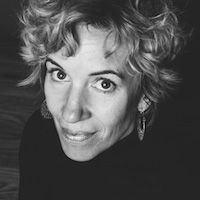
According to the calendar, ‘tis the season of love.
For many of us, February conjures up sentimental memories of those little boxes of heart-shaped candies printed with strange sayings, white paper doilies, and shoeboxes stuffed with Peanuts Valentine cards.
This year, my memories also include a not-so-nostalgic reminder that two years ago on the first of February, I moved out of the home I shared with my ex-husband and into a tiny little bungalow with a new main man—my standard poodle, Oscar.
I don’t think there’s a Hallmark card for that.
Maybe it’s because of the season, or it may be the painful memory of a failed romance, but lately, I’ve been doing a lot of ruminating about love.
What is love anyway?
As I approach the two-year anniversary of my divorce, it makes me wonder—do we put too much pressure and importance on the thought of love and does this thinking limit us from experiencing true love?
Just this past week as I taught a yoga class, one of the students commented, “I’d be better off if I didn’t have a brain,” as she tried a balancing posture. I think what she was poignantly saying—after unsuccessfully trying time and again to gracefully stand on one leg—was that her thoughts were getting in the way of her half moon. Of course, we need our brains. But the thinking they do can cause all kinds of problems.
The narrative our brains may have about love is not necessarily true or helpful. We expect it to be pleasant, fulfilling and even mystical, but often, love is harrowing.
To truly love someone or some thing leaves you vulnerable to that very loss, yet loss is an unavoidable part of life. It is inescapable that sometimes the people and things we love and the things we lose will be the same.
Love is a never-ending flow of emotions we can get to know through meditation.
When we sit quietly and give our minds permission to be still, we can listen to our hearts and experience our feelings as they are—good, bad and ugly. Meditation teaches us to be brave enough to accept the vulnerability that comes with love. Sitting with our thoughts creates space for us to know the pain of our past and its extinguished possibilities, while revealing the hope of unknown love that allows us to move forward. In meditation, nothing is good or bad, it just is.
Meditation teaches us that no matter how joyous or painful, whatever our hearts are experiencing, it is okay and it can bring us to a place of love.
Back to the half-moon student: When I told her to stop worrying about the outcome of her efforts and to let go of her fear of falling or her fear of failing, she burst into the most spacious, beautiful half-moon anyone has ever seen. What had changed? She stopped worrying about the outcome. And she embodied the shape. She stopped thinking and instead felt the pose with all of her heart.
Believing in love means being courageous enough to tell our head to take a break and to open up to everything that we feel, no matter how happy or sad. It means listening to the beating of our own heart.
Give yourself the best gift of all: Take the time to sit, listen and feel, for that is love.
~
Author: Lisa Murphy
Image: Author’s own courtesy of @dearyoutattoo
Editor: Molly Murphy










Read 4 comments and reply